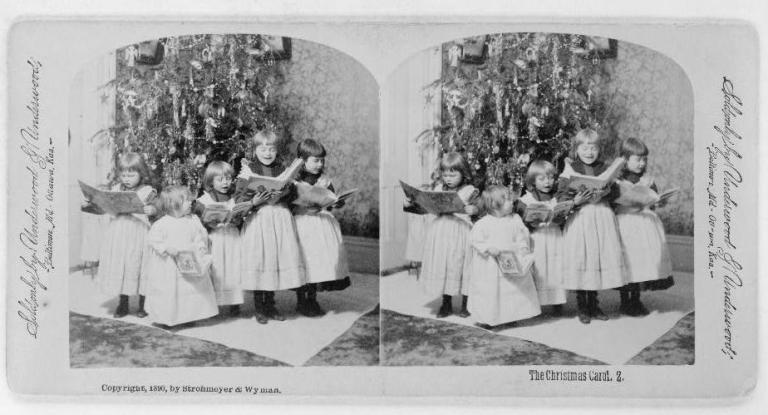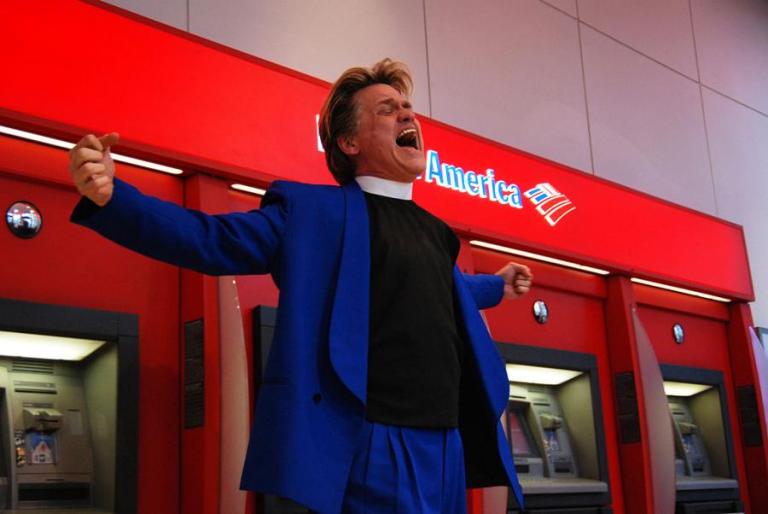
The dazzling lights and the decadent feasts all delight me, but the Christmas tradition that cheers my heart the most is a simple one: singing Christmas carols. There’s so much that I love about Christmas carols: the triumphant melodies, the rich harmonies, and the fact that I know all the words to the songs, even if I don’t know what the words actually mean. (Confession: I only learned a couple years ago what wassail really is, and I enthusiastically recommend it.) There is nothing I want more than the opportunity to sing “Ding Dong! Merrily On High” in four-part harmony with a gaggle of glogg-ed up revelers, and so the news of a community caroling event in downtown Indianapolis this past Saturday was glad tidings indeed.
But this wasn’t just any ordinary caroling party. The “Caroling for Clean Energy” event was organized by the Sierra Club’s Indiana Beyond Coal campaign, in collaboration with the Citizens Action Coalition and Hoosier Interfaith Power and Light, and it had a very specific purpose: to urge AES Indiana to shift to renewable energy and to retire the coal-burning Petersburg Generating Station, one the worst water polluters in Indiana and one of the worst air polluters and greenhouse gas emitters in the entire country. The organizers were using Christmas rituals of merriment and music-making as a form of public witness to confront climate change, the most defining crisis of our time.
The event—which was at once important and earnest and silly and lighthearted—revealed to me the political possibilities of Christmas carols. Christmas carols are powerful because they can be familiar and comforting at the very same time that they can be fresh and challenging. Our beloved canon of carols are exemplars of enduring tradition, but they can also serve as a playful and potent way of raising up our voices to call for change.

The “Caroling for Clean Energy” event was not the first time I had come across efforts to use carols for social and political change. The most famous example of contemporary Christmas carol activism is Reverend Billy and the Church of Stop Shopping, a radical performance art community that blurs the boundaries between art, activism, and religion in its effort to address a wide range of issues, from consumerism and corporate greed to racial justice and pollution. At the center of the effort is William Talen, who portrays Reverend Billy, a character developed in the tradition of radical Christian preachers that troubles the distinction between the religious and the secular. In describing the events at which he preaches, he says that “it’s definitely a church service” but also “a political rally, it’s theater, it’s all three, it’s none of them.” Alisa Soloman, the editor of The Reverend Billy Project, also emphasizes that Reverend Billy’s work is not mere parody of religion. As she explains, “There’s a tendency at first to look at Reverend Billy and say, ‘Oh, yeah. We know this joke: Here’s a guy who’s making fun of the Jimmy Swaggarts. But he’s not just making fun of the preacher role; he’s making use of it. Reverend Billy is not a role that he just puts on and plays: he really is Reverend Billy.”
Reverend Billy is best known for his performances during the holiday season, when the consumerist excess of Christmas provides the perfect backdrop for a crusade against capitalism and climate catastrophe. Across the country, he preaches fire and brimstone sermons about the “shopocalypse,” performs exorcisms on people addicted to credit cards, and sets up booths where the purchase-prone penitent can confess their shopping sins.
Best of all, there is music. With the Church of Stop Shopping Gospel Choir, Reverend Billy perfects the art of Christmas carol activism in jubilant concerts at local churches and guerrilla performances in shopping malls. In 2005, he and the choir even infiltrated Disneyland—which he described “the Promised Land”—for a Christmas Day performance, the culmination of a cross-country tour chronicled in the documentary What Would Jesus Buy?
In this film, one of the most memorable performances occurred in an affluent suburb, where Reverend Billy and his choir went door to door to sing cheerful Christmas carols with anti-consumerist messages. On the front steps of their splendidly decorated homes, wealthy families encountered a jubilant Reverend Billy crying out “Hallelujah!” as the Church of Stop Shopping Gospel Choir presented their version of “Deck the Halls”:
Pack the malls with folks with money
Fa la la la la la la la la
’Tis the season to be dummies
Fa la la la la la la la la
Squeeze our fat in Gap apparel
Fa la la la la la la la la
Buy some junk for cousin Carol
Fa la la la la la la la la
See the hostile crowds before us
Fa la la la la la la la la
Grab the last toy, more stuff for us
Fa la la la la la la la la
Avoid the mob of greedy parents
Fa la la la la la la la la
Fake smiles are just for appearance
Fa la la la la la la la la
And then there was “Joy to the World”:
Joy to the world
In the form of goods
Consume! Consume! Consume!
Bright plastic this and thats!??
For screaming little brats
Take the SUV to the mall
Take the SUV to the mall
And buy, buy, buy, buy, buy, buy, buy, buy it all
All boys and girls
The time has come
Rejoice! Rejoice! Rejoice!
Don’t let the chain stores fool you
We’ve come around to school you
You don’t need all that junk
You don’t need all that junk
We don’t, we don’t need so much junk
They were trolling, in both senses of the word, but in a way that was playful and delightful and, I would argue, effective. Some people were enthusiastic about the message and sang along. (“I love this!” exclaimed one man. “Ok, I feel you, man, I really do!”) But even the people who appeared confused or uncomfortable still grinned and laughed. They might not have agreed with the message, but they were clearly paying attention.
And this is the magic of Christmas carols: they can cause people to stop and listen, even smile. In our hyper-polarized political environment, convincing people to give their attention is an achievement in itself. Disarming them through musical delight is even better.
The anti-coal caroling party in Indianapolis this past weekend revealed similar dynamics. This event was decidedly more laid-back than Rev. Billy’s highly choreographed concerts, guerrilla theatre, and direct-action campaigns. There were no costumes, no exorcisms, and no arrests. The pandemic also introduced complications: the gathering, originally planned to take place in Monument Circle in front of AES Headquarters, shifted to Zoom at the last minute due to rising Covid cases in Marion County. Nonetheless, the event, like other climate change caroling events, involved a similar combination of playful political activism, Christmas cheer, and faith in action.
The event began with remarks by Rev. T. Wyatt Watkins, Pastor of Cumberland First Baptist Church and Past Chair of Hoosier Interfaith Power & Light. Then there was a crafting party to create Christmas cards to send to Kristin Lund, President and CEO of AES Indiana, to urge her to take action on the highly polluting Petersburg generator and plead for no coal this Christmas.
Best of all, there was a round of carols with clean energy messages. Rev. Watkins launched the singing with a version of “Away in the Manger” that decried pollution and capitalist greed:
While the smokestacks were stacking each billowy head
Of arsenic, chromium, mercury, lead
While shareholders were molding their bold bottom lines
Of monetized carbon in large dollar signs
One verse also celebrated the persistence of local environmental activists:
…A funny thing happened to turn things around
Brave feet started marching and covering ground
While clear valiant voices spoke truth unto power
Intent to be heard and refusing to cower
The event closed with a group singing of “Deck the Halls” that advocated for solar energy:
Deck the roofs with solar panels
Fa la la la la, la la la la
’Tis the season to be healthy
Fa la la la la, la la la la
Dirty Coal has got to go-o
Fa la la la la, la la la la
Retire toxic Petersburg coal plant
Fa la la la la, la la la la
Deck the city with solar power
Fa la la la la, la la la la
‘Tis the season to go green
Fa la la la la, la la la la
Greenhouse gas has got to go
Fa la la la la, la la la la
Retire toxic Petersburg coal plant
Faaaaa la la la la, la la la la
None of us are professional singers, so we were perhaps a bit out of tune, and we had a good laugh when we finished—for some people, perhaps out of relief. But I also found a genuine sense of pleasure at coming together with strangers for a caroling party, and not simply because it was the chance to sing. It simply felt good to make music, merrily, and with a message that matters.
Singing Christmas carols is often maligned for being basic, which is probably the most insulting thing that you can say to a millennial like myself. But as the Church of Stop Shopping and the Caroling for Clean Energy event both show, it doesn’t have to be that way. Christmas carols can be staid and status quo-preserving, but they can also be sincere, silly, and subversive. They can be a medium for bringing people together, getting people to listen, and convincing people to work for change. Ultimately, as these Christmas carol activists show, Christmas carols can be about more than making just music. The music can be about making the world just.













